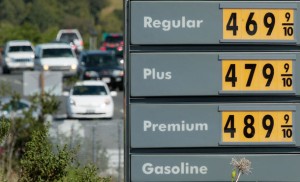President Obama's Oil Change: Cut Tax Breaks, Invest in Jobs
 Although gas prices and profits hit record highs in 2011, Big Oil kept receiving tax breaks better used as investments in the middle class
Although gas prices and profits hit record highs in 2011, Big Oil kept receiving tax breaks better used as investments in the middle classPresident Barack Obama’s proposed budget for fiscal year 2013 sets a responsible course for rebuilding the economy so that it works for everyone, not just the privileged few. Our middle class is the engine of economic growth, but is threatened by dwindling public investments, a tax system increasingly rigged to benefit the wealthy, a fraying safety net, and assaults on what should be the bedrock guarantees of Medicare, Medicaid, and Social Security.
The president’s budget protects those guarantees, boosts critical investments, and takes steps toward rebalancing the tax code so that all pay their fair share. And it does this in a fiscally responsible way, charting a path that nurtures the economic recovery while reducing the federal deficit, all without asking the middle class to shoulder a disproportionate share of the burden.
President Obama’s proposed fiscal year 2013 budget would make taxes fairer by, among other things, eliminating $40 billion in tax breaks over 10 years for oil and gas companies. About one-fourth of the savings would be invested in domestic manufacturing, which would create jobs.
Oil and gas companies are raking in record profits and clearly do not need these tax breaks. The big five oil companies—BP, Chevron, ConocoPhillips, ExxonMobil, and Shell—made a combined profit of $137 billion in 2011. This beats their previous 21st century record of $136 billion (2011$) in 2008, and ExxonMobil, Chevron, and ConocoPhillips were the first, fourth, and 15th most profitable companies on the Fortune 100 List in 2011.
Despite these humongous earnings, however, the American Petroleum Institute—Big Oil’s political arm—will likely trot out its tired excuses about why hugely profitable oil companies need $40 billion in tax breaks while middle-class Americans are paying higher gasoline prices.
Let’s review their arguments for keeping these unfair tax breaks:
***The companies can’t afford to lose these tax breaks? Please. The total revenue loss for the entire industry is about 1 percent over the next decade.
***Removing tax breaks will cost jobs? Nope. Despite more than $1 trillion in profits between 2001 and 2011, the big five oil companies have shed more than 11,000 U.S. jobs over the past few years, according to “Profits and Pink Slips: How Big Oil and Gas Companies Are Not Creating U.S. Jobs or Paying Their Fair Share” by the House Natural Resource Committee Democrats.
***Giving taxpayers’ money to oil companies will help increase oil production? Unlikely. The big five oil companies actually produced 4 percent less oil in 2011 compared to 2010 despite earning 75 percent more in profits. (Or 36 percent more compared to 2010 if BP is excluded due to its huge 2010 losses from the BP oil disaster.)
***Big Oil companies need as much revenue as possible for exploration? Wrong again. In 2011 the big five companies spent $38 billion—or 28 percent of their profits—buying back their own stock to enrich their top executives, board of directors, and biggest shareholders instead of using these revenues to produce oil and gas from thousands of undeveloped leases. The big five companies also had $58 billion in cash reserves at the end of 2011.
***Big Oil companies already pay their fair share of taxes? Not always. ExxonMobil said that it paid an effective federal tax rate of 18 percent in 2010. The average family’s effective federal rate is 21 percent.
***Huge Big Oil earnings provide big benefits to Americans whose retirement plans own oil stock? Quite an exaggeration. For instance, an American Petroleum Institute spokesman notes that the California government employees’ pension plan held more than 4 percent of its investments in oil stock. But removing $4 billion in annual tax breaks from companies that made $138 billion in 2011 would have such a tiny impact on middle-class retirees’ accounts that it would have almost no fiscal effect.
These tax break funds should be used to benefit middle-class Americans—our engine of economic growth—instead of just a handful of extremely wealthy oil companies. The administration would use about one-fourth of the $40 billion in savings to create jobs and build up domestic manufacturing companies with investments in energy efficiency and advanced manufacturing.
We face many economic challenges. The United States must make investments in industries that can rebuild the middle class, build companies that can compete with other nations, reduce pollution from oil and coal, and shrink a huge federal budget deficit. A relatively painless way to further these goals is to eliminate $40 billion of tax breaks for some of the richest companies in the land. As President Obama said today, “That’s not class warfare. That’s common sense.”
You can return to the main Market News page, or press the Back button on your browser.

